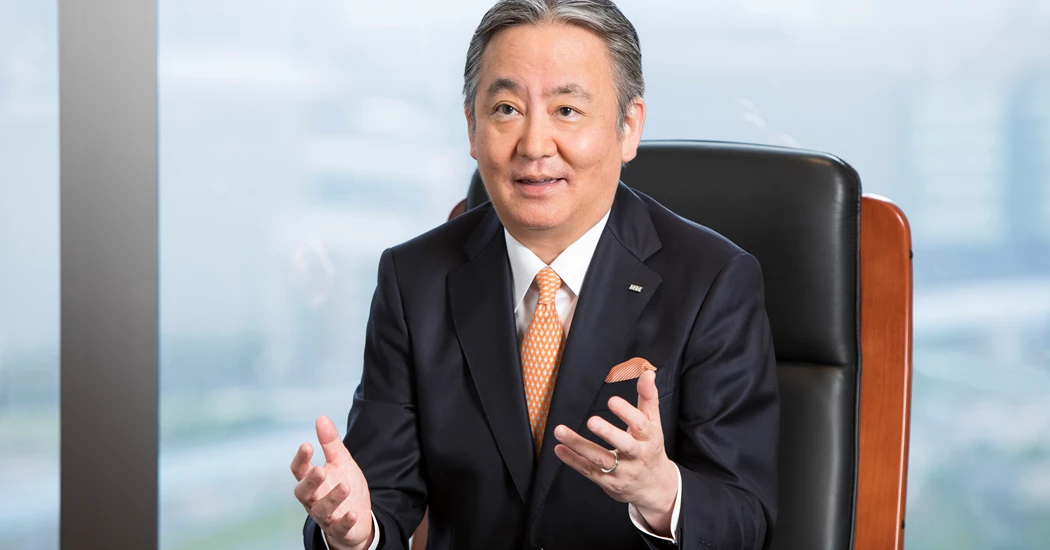Aiming to reduce CO₂ emissions with ammonia
IHI aims to achieve carbon neutrality throughout the value chain by 2050, promoting innovation and the active participation of diverse human resources in the process.
IHI President Hiroshi Ide said that the business environment has completely changed following the pandemic – which led the company to announce “Project Change” in 2021 as an initiative to transform the business in line with changes in the environment. The next medium-term management plan underway this year is seeing an emphasis on “appropriate management that takes society and the environment into consideration with ESG as the axis of values”.
IHI's management philosophy is "Contribute to the development of society with technology" and "Human resources are our greatest and only asset."
“We are proud that this is a precursor to the ESG philosophy. In the 170 years since our founding to build large ships to compete with the Western powers in the wake of the Perry Expedition's arrival, we have been working to solve social issues around the world through our business. This time, we have reorganized it as the ESG Management for the IHI Group,” Hiroshi said.
Regarding the progress of Project Change, the company is making steady progress in expanding lifecycle businesses, transforming business structures, and creating growth businesses to further strengthen the earnings base. “We have also reduced fixed costs and inventories and separated the pharmaceutical plant business… we will achieve carbon neutrality throughout the value chain in 50 years,” he said.
In order to achieve carbon neutrality, it is necessary to reduce CO₂ emissions, and there are two ways of thinking about this. The use of ammonia and hydrogen, which IHI is focusing on, will take some time to be realised and the company is positioning these new technologies as transformation.
On the other hand, in the transition until this is realised, IHI will promote CO₂ reduction through existing technologies. “In Indonesia, we are assisting in the renovation of high-efficiency coal-fired power generation, and in North America, we are adjusting the supply and demand of solar power generation with storage batteries and our energy management system (EMS). Composite materials and ceramics are used in aircraft engines to improve fuel efficiency by reducing weight. Fuel cell vehicles in Germany are equipped with turbo compressors. IHI's technology is used in various fields to contribute to CO₂ reduction,” Hiroshi said.
“In terms of the transformation phase, JERA's Hekinan Thermal Power Plant Unit 4 (output: 1 million kW) will jointly conduct a demonstration project aimed at co-firing 20% ammonia by 2024. In addition, we have succeeded in 100% mono-firing of liquid ammonia with our natural gas (LNG) turbine (2000kW class). We plan to gradually increase the mixing ratio in the future. In order to implement power generation using ammonia in society, it is also necessary to build a value chain,” he added.
The future will be a test of how to use the energy transition to overcome the challenges of the emerging business landscape, he said.
“We are also focusing on the active participation of diverse human resources. Covid-19 led to a review of the way we work, but it was also a review of our way of life. We came to the conclusion that our human resources should be placed at the forefront, and thus we established the IHI Group Human Rights Policy. This policy ensures a healthy and safe workplace for workers and respect to their basic rights. We will strengthen supply chain management and build a system that enables centralized management of human rights risks on a global basis,” Hiroshi said.
Human resources with diverse values and backgrounds are the source of innovation for IHI, and according to Hiroshi this is an important management issue. “For 20 years, we established an open recruitment system called an in-house side job, and we decided that we could use up to 20% of our working hours to realise ideas that were passed during the screening. Through this activity, you will have an opportunity to learn what kind of people are in the company, and if you are an engineer, you will be able to expand the range of people. We also introduced a second job system,” he said.
IHI is a company that is also active in digital transformation (DX). The effects of DX are beginning to appear in various places, such as jointly developing a system with Hokkaido Electric Power Company to enhance boiler operation and maintenance support at the Ide Thermal Power Station. “It helps reduce inventories by visualizing processes at engine factories where a large number of parts flow. It's not enough yet, but I want to take it in that direction to unlock the power of digital,” Hiroshi said.
KEEPING THE ENERGY INDUSTRY CONNECTED
Subscribe to our newsletter and get the best of Energy Connects directly to your inbox each week.
By subscribing, you agree to the processing of your personal data by dmg events as described in the Privacy Policy.















